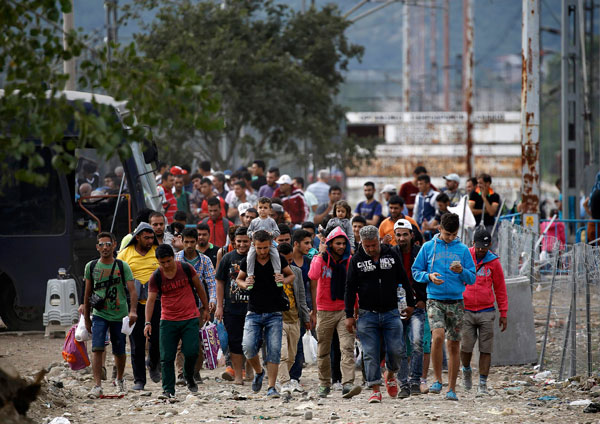|
 |
|
Syrian refugees walk towards Greece's border with Macedonia, moments before crossing near the Greek village of Idomeni, September 9, 2015.[Photo/Agencies] |
-- Responses of western countries, int'l organizations
Western countries are either engaged in horse-trading in the tally of refugees they are willing to take or adopting a wait-and-see approach to the issue.
German Chancellor Angela Merkel and Swedish Prime Minister Stefan Lofven on Tuesday called for reforming the European asylum policy, which includes mandatory quotas for distributing refugees among the states of the European Union (EU).
Currently, Sweden and Germany are the countries in the EU that take in the largest share of refugees. The two countries are receiving around 60 percent of all refugees from Syria.
While Germany and Austria expect to receive 800,000 refugees and migrants this year, U.S. State Department spokesperson John Kirby has said the United States had planned to receive 1,500 refugees from Syria, which is far from enough given the fact that there is an exodus of 4 million refugees from the Middle East country.
French President Francois Hollande and British Prime Minister David Cameron also called for a "permanent and binding mechanism to ensure a fair distribution between Europe member states" to address the situation.
France plans to open its doors to some 24,000 Syrian refugees from camps in the Middle East over the next two years, while Britain pledged to host 20,000 asylum seekers by 2020. Britain has accepted 216 Syrian refugees under a scheme to relocate the most vulnerable starting in January 2014.
The Bulgarian government in June adopted a five-year national strategy on migration, asylum and integration. According to the strategy, Bulgaria hopes to turn migration and mobility into positive factors for economic and demographic development, and the fight against illegal migration and human trafficking.
UN Secretary-General Ban Ki-moon has stressed that the large majority of people arriving in Europe are refugees fleeing war and violence, who have a right to seek asylum without any form of discrimination.
He also assured European leaders of the United Nations' readiness, through its agencies, to continue supporting their efforts to develop a response that is effective, feasible and in line with universal human rights and humanitarian standards, including the right to claim asylum.
The UN chief will host a high-level meeting on migration and refugees in New York on Sept. 30.
The Parliamentary Assembly of the Council of Europe will meet later this month starting on Sept. 28. Several debates will surround the migrant crisis, including discussions on the need to reform the Dublin Regulations which set out rules for registering refugees and asylum seekers in the EU.